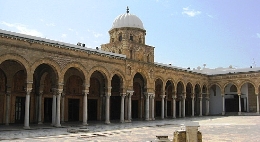|
| Education System in Tunisia |
Primary Education
Education is a high priority in Tunisia as it has been for many years since independence. The academic year runs from October through to June, and the medium of education is Arabic. Students are tested at the end of each trimester, through oral and written tests, and practical examinations too. The initial phase of their free basic education begins with 6 years at primary school.
Middle Education
The final 3 years of preparatory education take place at middle school. Here a score of over 50% is required to pass the examination for the Diplôme de Fin d’Études de l’Enseignement, that opens the door to secondary school.
Secondary Education
At secondary school, students staying on for 4 years have a choice between following an academic or a technical track. For the first 2 years they stay with a common academic curriculum though. After that, academic students may follow one of 5 specializations, while others complete their final 2 years in a more vocational environment.
Vocational Education
The ministry of employment administers an ongoing vocational program by settling standards, licensing training providers and maintaining quality control.
Tertiary Education
 Tertiary education opportunities in Tunisia have expanded rapidly during the past decade and total student numbers now approach 350,000. In total, there are 13 universities, 24 institutes of technological studies and 6 higher institutes of teacher training.
Tertiary education opportunities in Tunisia have expanded rapidly during the past decade and total student numbers now approach 350,000. In total, there are 13 universities, 24 institutes of technological studies and 6 higher institutes of teacher training.
The Zaitouna Mosque and University illustrated here is thought to have been established in the year 732. It has played a prominent part in the history, religious life and culture of this ancient land, although more recently it has struggled to keep up with change.